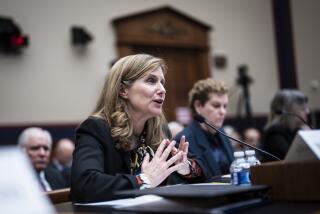Anxious leaders are better than easygoing ones, author says
Cass Sunstein is a professor and legal scholar at Harvard Law School, the author of numerous books and the former administrator of the White House Office of Information and Regulatory Affairs. He spoke about his experiences in the Obama administration, his views on regulatory policy and leadership, his favorite sport (squash) and being married to a powerful woman.
The interview was edited for length and clarity.
Q. In your new book, “Wiser: Getting Beyond Groupthink to Make Groups Smarter,” you divide leaders into two categories: those who are complacent and easygoing and those who are anxious. Which type makes a better leader?
A. A complacent leader is someone who is upbeat, optimistic, who has a clear sense of direction, who is quite confident that things will be fine and who has a degree of sunniness. An anxious leader is someone who may be easy to get along with but also is thinking about all the things that could go wrong and always seeing the worst-case scenario.
There is no question that the anxious leader is much better than the complacent leader. The anxious leader is able to redirect energies, listen to information from employees and won’t continue the course of action if it’s failing. The anxious leader also will be flexible and inventive and will foresee things that could go wrong. There’s a saying that goes, “If you make a plan, God laughs. If you make two plans, God smiles.” The anxious leaders are making two plans.
Q. Can you give me an example of someone who fits the anxious leader model?
A. Jeff Zients, who is now the head of the National Economic Council, was brought in by the president to fix HealthCare.gov. I’m sure he was always thinking about what could go wrong. And more specifically, saying, “This could be a catastrophe. If that’s a risk, then what will we do about it?”
Having a constant productive anxiety doesn’t mean that people are miserable and wailing but that people know they will be held accountable if things do not go right.
Q. What was one of the most surprising lessons you learned about government during your time as the president’s regulatory chief?
A. There’s no question that one surprise stood above all the others — and that is that the public comment process for federal regulations is immensely important and very substantive. I taught administrative law for many years, and many teachers of the subject think that the public comment process is a TV show, and what actually is determined happens behind closed doors. That view is completely wrong.
When you set a rule out for public comment, whether it involves air pollution or highway safety or healthcare, you will often get comments saying, “This section is going to hurt small business,” or, “This provision could be changed in a way to get the public safety impact doubled.” Those are phenomenally helpful. You learn that you miss some things.
Sometimes what was missed was not huge but, if fixed, would save hundreds of millions of dollars for people who deserved those savings. And sometimes you learn the whole proposal was misdirected or wrong. I did not expect the public comment process to be as substantively crucial as it is. I hope that’s true in every administration.
Q. In your role overseeing federal regulations, you were involved in a lot of hot-button issues. You had your fans and your critics on the left and right. How did you approach this job?
A. Economic growth was the top priority, and we were not going to be doing a lot of the regulations by historical standards. If we have benefits that exceed costs, that’s a good reason to go forward; if the costs were too high for those benefits, it was a good reason not to go forward.
If there was a rule that would save dozens or hundreds of lives and it wouldn’t cost all that much, then I’d be for that, even if the people who bore those costs didn’t like it very much. If there was a rule favored by environmentalists or the progressive community that actually was going to hammer the economy and have modest benefits, say in terms of health and safety, then I’d be very cautious about that. The focus was on the actual consequences and not on background noise from the political actors.
Q. What would people be surprised to know about you?
A. I am a professional squash player and I recently played badly, but as well as I could, in a professional squash tournament. A professional squash player might sound like someone who is in a food-tasting group, but it is a racquet sport. I recently played in the Charlotte Open, where I got crushed by the 105th best player in the world. Being crushed was an honor.
Q. What’s it like to be married to Samantha Power, the U.S. ambassador to the United Nations?
A. She’s completely amazing. Being married to her is sometimes poignant, when things aren’t going so great in some parts of the world. Being married to her is sometimes hilariously funny, because she is really funny herself. I think the least good part is when I get called in my place of residence “Mr. Power.” The best part is when the two of us go out to dinner.
Fox is a vice president at the nonprofit Partnership for Public Service. He is guest contributor to the Washington Post’s On Leadership section.






